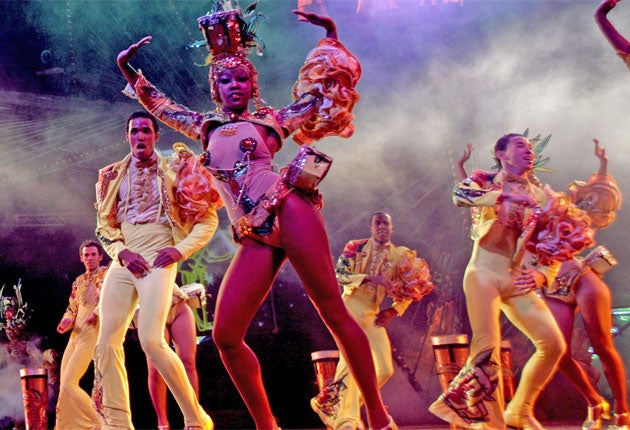The Tropicana: Seventy and still clubbing
Since it opened in 1940, Cuba's legendary nightspot has hosted Mafia dons, Hollywood stars and Soviet leaders

No matter how severe your hangover, you'll almost certainly be feeling brighter and breezier this morning than the patrons of The Tropicana, the legendary Havana nightspot which has now been a hotbed of Cuban culture, music and hedonism for exactly 70 years.
On 1 January 1940, workers at the suburban mansion set in six acres of tropical garden, were busy sweeping up sequins and feathers, emptying cigar butts from ashtrays, and throwing out empty rum bottles, on the morning after the club's glamorous opening night.
Today, exactly seven decades later, they're mounting a similar clean-up operation after a week-long party to celebrate the anniversary of a venue that can claim to be the only outpost of capitalist decadence in the world to have survived decades of puritanical communist rule not only unscathed but with its reputation enhanced.
The Trop, as it is fondly known, first popularised the showgirl. For generations, it has been responsible for exporting Latin music to the clubs of America, and Europe. Everyone from Paul Robeson to Nat King Cole to Liberace has sashayed across its tree-lined stage.
Patrons during its "Golden Age" in the 1950s included Hemingway, Brando, Sinatra and Edith Piaf. Sharing the bar, on any given night, were some of the world's most notorious gangsters. Later, during the Cuban Missile Crisis, Fidel and Raul Castro were rumoured to have entertained Russian dignitaries there.
Whatever has changed, The Tropicana's "vibe" remains broadly the same: it provides willing punters with an intoxicating glimpse back into the Guys and Dolls era, where Cuba was America's racy "pleasure island" and pretty much anything went.
The club was celebrating its big birthday this week with a gala showcasing all the glitz, kitsch and razzle-dazzle you'd expect. It included tributes to Nat King Cole and Rita Mont- aner, a big band, acrobats, contortionists in leotards, and a chorus line singing "The Banana Boat Song."
The club's future will inevitably be shaped by Cuba's relations with the US. Talk of a thaw following the election of President Obama, who loosened some Bush-era policies, making it easier for Cuban-Americans to travel and send money home, has recently quietened. Until the age-old US trade embargo with Havana is lifted, the club's clientele will remain predominantly European tourists.
The Tropicana story began at the end of the Great Depression, when a Havana socialite who'd fallen on hard times decided to rent her home, The Villa Mina, to Rafael Mascaro and Luis Bula, two would-be casino owners who hoped to attract gamblers to their tables by staging a colourful revue in its garden.
They hired Victor de Correa, a Brazilian-born choreographer, to run the entertainment. He dreamed up a spectacle that combined Latin music with dancing ladies, inspired by his native country's Mardi Gras carnival. Adored by wealthy US tourists and the local gentry, The Tropicana swiftly became the nation's most popular nightclub.
During the Second World War, ownership passed into the hands of Martin Fox, who capitalised on the explosion of international tourism during the 1950s to turn the club into a centrepiece of one of the world's most decadent and glamorous destinations.
But Havana's success came at a price. Many casinos and nightclubs fell into the hands of the Mob. Whether The Tropicana was a Mafia property has been hotly debated. Most historians believe that Fox became a front man for the club's real owners, Santo "Louie Santos" Trafficante Jr and Meyer Lansky, Mafia dons who controlled organised crime on the East Coast of the US.
But the Mafia link is far from confirmed. "There's a difference between having underworld connections and having the underworld run your club," said Rosa Lowinger, author of a history of the club, this week. "Martin Fox had connections, but he wasn't a gangster. There are those who want to paint Cuba, pre-revolution, as a profligate country which got what was coming to it. But it wasn't quite that simple."
Either way, The Tropicana was eventually targeted by Communist revolutionaries, who detonated a bomb there in 1956 in an unsuccessful attempt at killing some of the Mafia leaders they believed were corrupting the country. And the venue was properly shut down when Castro seized power in 1959. Trafficante was interned and Martin Fox fled.
The Tropicana also seemed doomed. But it was eventually allowed to endure, minus the gambling, as a venue to entertain Cuba's new political elite (who were never averse to a bit of champagne socialism), and Castro's foreign guests from the Soviet block.
"It hung on by the skin of its teeth," says Lowinger. "At one point, Raul Castro wanted to turn it into a military facility. But his next door neighbour, who was one of the caretakers at The Tropicana and a good revolutionary, went to see him and argued that it could be a potential goldmine for the revolution."
Since then, it has prospered. An estimated 200,000 people visited in 2008 and 150,000 this year, paying roughly $80 (£50) a head to get in – a sum far beyond the reach of ordinary Cubans, who can only normally gain access by working for the Government, or being invited as a reward for excelling at work.
Join our commenting forum
Join thought-provoking conversations, follow other Independent readers and see their replies
Comments
Bookmark popover
Removed from bookmarks